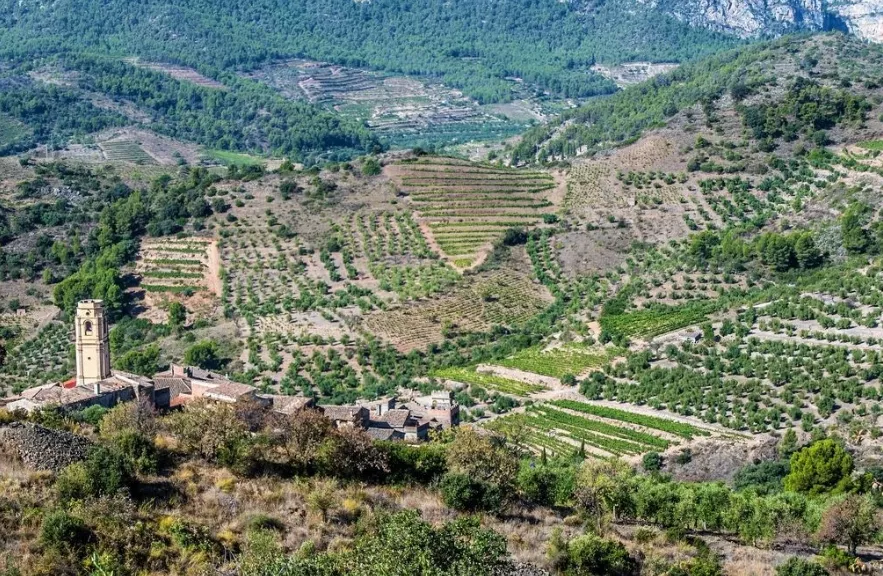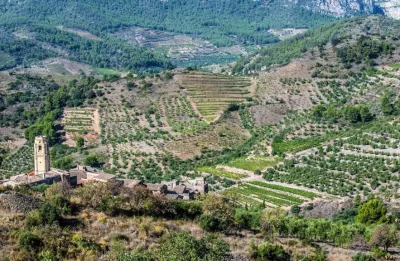Summary
The Landscape Observatory of Catalonia is a consortium attached to the Catalan government’s Department of Territory. The consortium was recognised by the 2005 Law on the Protection, Management and Planning of the Landscape in Catalonia. It acts as an advisory body to improve landscape quality and support public policies.
The Landscape Charter is a voluntary instrument created by the Catalan Landscape Law, setting out common objectives, agreements, and management strategies among public and private organisations in a supra-municipal area to enhance its landscape. It requires strong leadership and commitment from local actors and authorities.
The application of the Landscape Charter in the Priorat region has fostered self-organisation on the territory, and coordination and cooperation among different actors, ensuring a participatory and efficient governance system.
Results
Priorat’s Landscape Charter has provided a comprehensive roadmap for the socio-economic development of the rural area, addressing the needs and priorities of diverse stakeholders and coordinating their efforts. Concrete results achieved by this initiative include:
- UNESCO World Heritage status application leading to the creation of a Landscape Management System;
- local agreement on renewable energy, resulting in the development of a county plan;
- establishment of an agricultural sector plan, involving planning and zoning for land use;
- a deal for promoting sustainable tourism;
- implementation of a Charter on water;
- set-up of a ‘land bank’ and efforts to dynamise agriculture;
- educational programme ‘Let’s Know Priorat’ (es ’Coneguem el Priorat’) which develops content for rural schools;
- ‘Inhabit’ (es ‘Habitar’) exhibition based on input from rural residents;
- strategic initiatives to reverse depopulation, including housing plans, economic diversification, local sourcing, and urban planning, with the participation of all municipalities.
Resources
Documents
Context
Priorat, situated in Tarragona province of Catalonia, Spain, spans 498 km2 of mostly hilly terrain with limited transport links. Comprising 23 municipalities, 18 of which with fewer than 500 residents, the region has seen a steady population decline over the past two decades.
Despite its renowned wines and oils and a well-established tourism sector built on quality services, Priorat faces significant challenges. These include population decline, need for economic diversification, and enhancing the agricultural sector by extending the value chain of local products. Housing remains a critical issue, alongside territorial planning and safeguarding energy and food security.
Priorat adopted a Landscape Charter to address these challenges by coordinating efforts among public and private stakeholders across municipal boundaries.
Objectives
-
Establish a territorial model focused on respect, sustainability, and adaptation of human activities to the values of the territory and landscape;
-
Facilitate community-led diagnosis and definition of actions for: territorial model implementation; and enhanced coordination and cooperation among all stakeholders;
-
Address the root causes of population decline and mitigate depopulation pressures.
Activities, key actors, and timeline
Priorat has set up the Landscape and Sustainability Commission, a consultative and advisory body to support enhanced coordination and control of territorial, landscape and sustainability policies in the Priorat region. Over 20 public and private regional organisations in the rural area, including the Local Action Group (LAG), are active members.
The Commission has six bodies operating at the decision, execution and participation stages. This management system conducts diagnosis of challenges, facilitates public and private cooperation, and participation, while ensuring landscape protection. It does so by:
-
Proposing and advising on initiatives linked to landscape and sustainability policies and carrying out their coordination;
-
Ensuring permanent and regular communication among institutions, public and private stakeholders to facilitate coordination and transversality;
-
Promoting a participatory approach, notably through open fora.
The open fora are participative entities that encourage debate and drive initiatives within specific sectors involved in landscape management. Each sectorial forum involves interested individuals and representatives from various landscape management areas. Currently, there are four active fora on agriculture, tourism, education, and culture.
This model allows the Priorat region to take decisions in a participatory way, through cooperation with other administrations, set-up of dedicated working groups, follow-up on adopted agreements, and work proposals decided in accordance with the region’s needs.
Success factors/lessons learnt
-
Enable the Priorat region to establish and implement a self-governed management model that reflects the objectives of the Rural Pact;
-
Set common objectives and agreements between public and private agents;
-
Coordinate among local and regional administrations, and civil society through a bottom-up approach;
-
Rely on the region's own values and resources as a driving force for socio-economic development;
-
Employ a replicable methodology that encourages and monitors voluntary commitments to support the local Rural Pact.
Contacts
Consell Comarcal Priorat, Landscape Office, Elisa Barceló, ebarcelo@priorat.cat, +34 977830119
Landscape Observatory, Pere Sala, observatori@catpaisatge.net, +34 972273564

